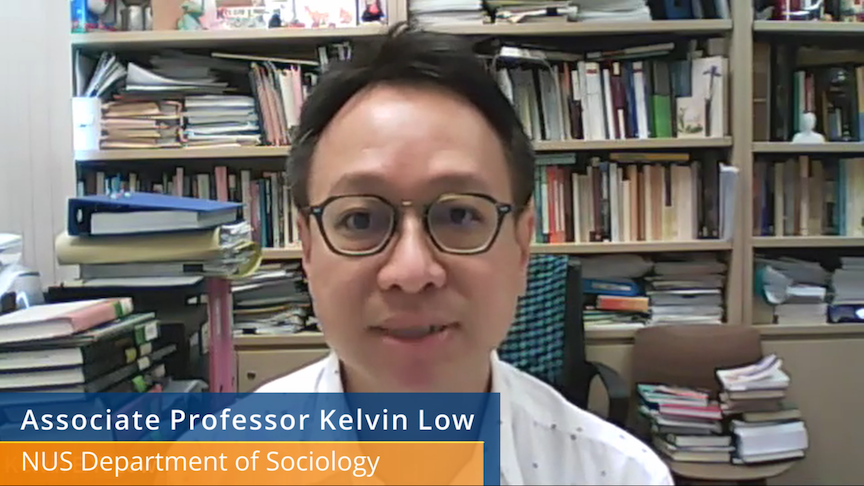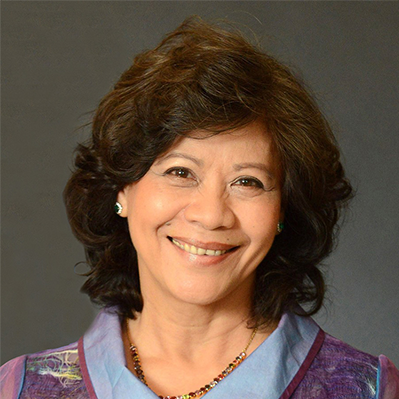Why Sociology?
Here at the National University of Singapore (NUS), the teachings and research of the Department of Sociology speaks to the complexities of everyday living that unfolds in diverse socio-cultural and political settings. From comparative historical sociology, to religion, family, demography studies and inequalities, we strive to equip our students with core theoretical and methodological skill sets with which to critically analyse any societal domain, comparatively and historically.
The effort is to produce skilled researchers – theoreticians and methodologists – who are trained to ask critical questions, formulate research problems, design and execute a research agenda effectively – skills that they can further translate into any context, and certainly beyond academic settings.


Message from our
Head of Department
Professor Kelvin Low is the Head of the Department of Sociology. His research interests cover: Senses and Society; Migration and Transnationalism; Social Memory, Historiography, Heritage; and, Food and Foodways. He is co-founder of the TG07 Senses and Society group in the International Sociological Association (ISA), Academic Editor of Social Justice and Democratisation Space (by ISA) and Social Sciences in Asia, and serves on the editorial advisory boards of The Senses and Society and Perspectives on Sensory History.
Curriculum
Single Major [B.Soc.Sci (Hons)]
Pass at least 60 units of SC coursess or SC-recognised courses which include the following:
- SC1101E Making Sense of Society
- SC2101 Methods of Social Research
- SC3101 Social Thought and Social Theory
- SC4101 Practising Anthropology and Sociology
- a minimum of 36 units at Level-3000 or higher (including courses SC3101 and SC4101) with a minimum of 20 units at Level-4000 or higher (including SC4101)
- a maximum of any 2 level-4000 SC-recognised courses
- a maximum of 2 level-5000 SC courses (subject to Department's approval)
Second Major
Pass at least 40 units of SC courses which include the following:
- SC1101E Making Sense of Society
- SC2101 Methods of Social Research
- SC3101 Social Thought and Social Theory
- a minimum of 16 units of SC courses at Level-3000 or higher (See Note 1) (including SC3101)
Note 1: Students are allowed to read level-4000 courses subject to Department's approval.
Note 2: Students should refer to the department website for prevailing course pre-requisites / preclusions.
Minor
Pass at least 20 units of SC courses, which include the following:
- SC1101E Making Sense of Society
- A minimum of 4 units at level-3000 or higher (excluding GEMs & SS courses offered by the Department)
Job Ready
Sociology graduates are in high demand in a variety of occupations that require inquiring, analytical and critical minds. A sociology degree will impart you with the critical intellectual capacity of examining controversial issues from a variety of perspectives. These critical thinking skills are invaluable in an era of fast paced social change and will be an asset regardless of your chosen career.
Our sociology graduates have found employment in administration and personnel, information and research, community service, management, the media industry, teaching, uniformed services, marketing, and public relations among others.
Why CHS?
The College of Humanities and Sciences (CHS) is the enhanced undergraduate experience for students of the Faculty of Arts & Social Sciences (FASS) and the Faculty of Science (FOS) at the National University of Singapore.
Scale of Impact
Taps and builds on the research expertise of two of the largest and most established faculties in Singapore.
Deliberate Curriculum Curation
A distinct interdisciplinary approach that emphasises the ability to draw connections, discover links and connect insights across disciplines.
Unparalleled Flexibility
Offers greater choice and unparalleled flexibility to pursue breadth and depth from more than 1,000 modules per academic year.
Testimonials

Dylan Huang
Sociology
Why study Sociology?
To me, the discipline of Sociology is like a toolbox filled with versatile skills that are key to understanding diverse social phenomena. The major has cultivated my ability to conduct empirical and rigorous research in the Social Sciences, from analysing demographic reports to conducting field interviews. Key to my learning experience are also my course instructors who seek to enhance an intellectual understanding of key social issues.
How has your time in FASS equipped you with skills for your future career/endeavours?
My time in FASS, especially as a Sociology major, has equipped me with relevant skills malleable to research roles across various industries. My learning experience as a whole has equipped me with both qualitative and quantitative research skills that I have been able to apply not just in my coursework, but in the working world. Such as during my recent internship at the Ministry of National Development where I helped collate statistics and draft reports on urban liveability. Outside of the public service and academia, such skills are highly relevant to roles in other fields such as Marketing and Consultancy. Academics aside. I have also had the opportunity to serve as the Vice Project Director of Arts Mode, an annual faculty-wide fashion runway. This experience has nurtured my abilities in project management and media production, complementing my suite of academic skills.
Wang Liurong
Sociology
Why study Sociology?
Studying sociology provided me with the space to comprehend my anger and uneasiness. We are often angry because we are so used to having answers; in fact, many things do not have an easy answer and won’t just end with an ‘answer’. Sociology led me to realise that ‘understanding’ the world is just as important as trying to ‘make sense’ of it. The future world will be more vibrant and unpredictable than the world today. While it will bring human society many unknown opportunities, it will also bring chaos and fear. In times like these, we need to be careful and avoid the urge to seek easy ways out by creating ‘simple answers’ to complex situations. These ‘simple answers’ have caused many problems, and furthermore obscured other problems from being recognized for what they are. Studying sociology gives me the courage to be confused, to embrace complexity instead of shunning it due to our intrinsic fear of the unknown.

Aloysius Zai
Sociology '20
Why study Sociology?
I have always been fascinated by the study of human behaviour, and with understanding why different people who are biologically the same can live in totally different ways and hold completely different ideologies. I believe that this acquired sensitivity to the mores and concerns of each sector of society will benefit me in the administration of public service, which is my other passion.
What do you intend to do after graduation?
Upon graduation, I am assuming duty at the Ministry of Home Affairs.


Dr Noeleen Heyzer
Social Scientist,
Member of United Nations (UN) Secretary-General's High Level Advisory Board on Mediation and former Under-Secretary General of the UN,
FASS Faculty Advisory Co-Chairperson
Sociology '71
Dr Noeleen Heyzer, a social scientist, is currently a member of the UN Secretary-General’s High Level Advisory Board on Mediation, which supports specific mediation efforts around the world. She was Under-Secretary-General of the United Nations (UN) from 2007 to 2015, and was the highest-ranking Singaporean in the UN system during her term. At the UN, she also served as: Executive Secretary of the UN Economic and Social Commission for Asia and the Pacific (2007-2014); Executive Director of the UN Development Fund for Women (1994-2007); and, the UN Secretary General's Special Advisor for Timor-Leste (2013-2015). Aside from her position as a FASS Faculty Advisory Board Member, Dr Heyzer is a distinguished fellow at the Singapore Management University and the Nanyang Technological University's S. Rajaratnam School of International Studies (RSIS) and a member of the Governing Board of the Lee Kuan Yew School of Public Policy at the National University of Singapore. Dr Heyzer is also Distinguished Arts and Social Sciences Award Winner (2017).
Tan Seng Chai
Chief Corporate and People Officer, CapitaLand Group
"It's a new normal we live in, and there are critical attributes the next-generation workforce must possess in order to thrive, including the willingness to learn, ability to innovate, and high adaptability. CapitaLand recognises this and proactively collaborates on opportunities that encourage the development of these traits. That is why we're supportive of the curriculum at NUS College of Humanities and Sciences. Its focus on interdisciplinary education coupled with experiential and problem-based learning will allow future-ready CHS graduates to handle a variety of workplace scenarios across different disciplines better, and put them in good stead to ride the waves of the future of work."

The Faculty of Arts and Social Sciences, National University of Singapore (NUS) is committed to environmental sustainability.
This e-brochure is part of our sustained effort to reduce waste and foster a culture of care for the environment among the NUS and broader community.

